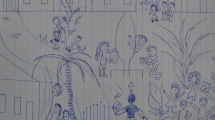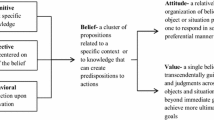Abstract
A collaborative curriculum development project was set up to address the lack of good examples of teaching about ideas and evidence and the nature of science encountered by student teachers training to teach in the age range 11–16 in schools in England. Student and teacher-mentor pairs devised, taught and evaluated novel lessons and approaches. The project design required increasing levels of critique through cycles of teaching, evaluation and revision of lessons. Data were gathered from interviews and students’ reports to assess the impact of the project on student teachers and to what extent any influences survived when they gained their first teaching posts. A significant outcome was the perception of teaching shifting from the delivery of standard lessons in prescribed ways to endeavours demanding creativity and decision-making. Although school-based factors limited newly qualified teachers’ chances to use new lessons and approaches and therefore act as change-agents in schools, the ability to critique curriculum materials and the recognition of the need to create space for professional dialogue were durable gains.
Similar content being viewed by others
References
Abd-El-Khalick, F., Bell, R. L., & Lederman, N. (1998). The nature of science and instructional practice: making the unnatural natural. Science Education, 82, 417–436. doi:10.1002/(SICI)1098-237X(199807)82:4<417::AID-SCE1>3.0.CO;2-E.
Barber, M., & Mourshed, M. (2007). How the world’s best-performing school systems come out on top. Dubai: McKinsey and Company.
Bennett, J. & Campbell, B. (2002). First steps in educational research: the experience of student teachers. The School Science Review, 84(307), 49–59.
Bennett, J., Lubben, F., Hogarth, S., & Campbell, B. (2004). A systematic review of the use of small-group discussions in science teaching with students aged 11–18, and their effects on students’ understanding in science or attitude to science. In: Research Evidence in Education Library. London: EPPI-Centre, Social Science Research Unit, Institute of Education, University of London.
Blake, D., Hanley, V., Jennings, M., & Lloyd, M. (1998). Mentoring in action on a primary PGCE course. Journal of Further and Higher Education, 22(3), 353–363. doi:10.1080/0309877980220310.
Braund, M. (2001). Helping primary student teachers understand pupils’ learning: exploring the student-mentor interaction. Mentoring & Tutoring, 9, 189–200. doi:10.1080/13611260120111978.
Braund, M., & Campbell, B. (2005). Improving teaching about ideas and evidence: final report of the YESITT Project. York: University of York Science Education Group.
Braund, M., Erduran, S., Simon, S., Taber, K., & Tweats, R. (2005). Teaching about Ideas and Evidence at Key Stage 3 (CD). London: Gatsby Trust/Science Enhancement Programme.
Brickhouse, N. W. (1990). Teachers’ beliefs about the nature of science and their relationship to classroom practice. Journal of Teacher Education, 41, 53–62. doi:10.1177/002248719004100307.
Cochran-Smith, M. (1991). Learning to teach against the grain. Harvard Educational Review, 61(3), 279–310.
Cordingley, P. Bell. M., Rundell, B., & Evans, D. (2003). The impact of collaborative CPD on classroom teaching and learning. In: Research Evidence in Education Library. Version 1.1. London: EPPI-Centre, Social Science Research Unit, Institute of Education, University of London.
Dawson, V. (2006). Argumentation about biotechnology with Western Australian high school students. Paper presented at the conference of the European Researchers in Didaktik of Biology [ERIDOB], London, September.
Department for Education and Employment/Qualifications and Curriculum Authority.(DFEE/QCA) (1999). Science: The national curriculum for England. London: The Department for Education and Employment and the Qualifications and Curriculum Authority.
Department for Education and Skills. (DfES) (2002a). Key stage 3 national strategy: Framework for teaching science: Years 7, 8 and 9. London: Department for Education and Skills.
Department for Education and Skills. (DfES) (2002b). Key stage 3 national strategy: Scientific enquiry—a resource pack for participants. London: Department for Education and Skills.
Department for Education and Skills/Qualifications and Curriculum Authority.(DFES/QCA) (2004). Science: The national curriculum for England—Revised Edition. London: The Department for Education and Employment and the Qualifications and Curriculum Authority.
Donnelly, J., Buchan, A., Jenkins, E., Laws, P., & Welford, G. (1996). Investigations by order: policy, curriculum and teachers’ work under the Education Reform Act. Nafferton: Studies in Education.
Driver, R., Leach, J., Millar, R., & Scott, P. (1996). Young people’s images of science. Buckingham: Open University Press.
Fleming, P. (2004). Becoming a secondary school teacher: How to make a success of your initial teacher training. London: David Fulton.
George, J., & Lubben, F. (2002). Facilitating teachers’ professional development through their involvement in creating context-based materials in science. International Journal of Educational Development, 22, 659–672. doi:10.1016/S0738-0593(01)00033-5.
Goodrum, D., Rennie, L., & Hackling, M. (2001). The status and quality of teaching and learning of science in Australian schools. Canberra: Commonwealth Department of Education, Training and Youth Affairs.
Hasweh, M. (1996). Effects of science teachers’ epistemological beliefs in teaching. Journal of Research in Science Teaching, 33(1), 47–63. doi:10.1002/(SICI)1098-2736(199601)33:1<47::AID-TEA3>3.0.CO;2-P.
Hodges, M., Scholtz, Z., Sadeck, M., Hendricks, D., Braund, M., Lubben, F., et al. (2005). Critical thinking in science: Developing a model of continuous professional development (CPD) to enable (science) teachers to develop critical thinking in their learners. Research Round table. In C. Kasanda, L. Muhammed, S. Akpo, & E. Nogolo (Eds.), Proceedings of the 13th Annual SAARMSTE Conference (pp. 61–67). Windhoek: Namibia, University of Namibia.
Hopkins, D., Ainscow, M., & West, M. (1994). School improvement in an era of change. London: Cassell.
Hopper, B. (2001). The role of the HEI tutor in initial teacher education school-based placements. Mentoring & Tutoring, 9, 211–222. doi:10.1080/13611260120111996.
House of Commons (2004). Secondary education: Teacher retention and recruitment: Fifth report of session 2003–04. London: House of Commons.
House of Lords (2006). Science teaching in schools: 10th report of the Science and Technology Committee. London: House of Lords.
Jeffrey, B., & Woods, O. (2003). The creative school: A framework for success, quality and effectiveness. London: Routledge Falmer.
Jofli, Z., & Watts, M. (1995). Changing teachers’ thinking through critical constructivism and critical action research. Teachers and Teaching, 1, 213–227. doi:10.1080/1354060950010205.
Johnson, S. (2004). Teaching ideas and evidence in science at key stage 3. Science Teacher Education, 41, 12–13.
Joyce, B., & Showers, B. (1995). Student achievement through staff development. White Plains, New York: Longman.
Kelly, G. (2005). Inquiry, activity and epistemic practice. Paper presented at the inquiry conference on developing a consensus research agenda. New Jersey: Rutgers University February.
Kelly, J. (2000). Rethinking the elementary science methods course: a case for content, pedagogy, and informal science education. International Journal of Science Education, 22(7), 755–777. doi:10.1080/09500690050044080.
Lave, J., & Wenger, E. (1991). Situated learning: Legitimate peripheral participation. Cambridge: Cambridge University Press.
Lederman, N. G. (1999). Teachers’ understanding of the nature of science and classroom practice: factors that facilitate or impede the relationship. Journal of Research in Science Teaching, 36(8), 916–929. doi:10.1002/(SICI)1098-2736(199910)36:8<916::AID-TEA2>3.0.CO;2-A.
Lederman, N. G. (1992). Students’ and teachers’ conceptions of the nature of science: a review of the research. Journal of Research in Science Teaching, 29, 331–359. doi:10.1002/tea.3660290404.
Millar, R. (2006). Twenty first century science: insights from the design and implementation of a scientific literacy approach in school science. International Journal of Science Education, 28(13), 1499–1521. doi:10.1080/09500690600718344.
Millar, R., & Osborne, J. (Eds.). (1998). Beyond 2000: Science education for the future. London: King’s College, School of Education.
Office for Standards in Education. (OfSTED) (2004). The key stage 3 strategy: Evaluation of the third year. London: Office for Standards in Education.
Osborne, J., Collins, S., Ratcliffe, M., Millar, R., & Duschl, R. (2003). What “ideas-about-science” should be taught in science? A Delphi study of the expert community. Journal of Research in Science Teaching, 40, 692–720. doi:10.1002/tea.10105.
Osborne, J., Erduran, S., & Simon, S. (2004). Ideas, evidence and argument in science (IDEAS PROJECT). London: Kings College, University of London.
Science Enhancement Programme (SEP) (2004). teaching ideas and evidence in science at key stage 3 (CD). London: Science Enhancement Programme.
Serret, N., & Reiss, M. (2006). Evaluation of GTEP award in tower hamlets: Final report. London: Institute of Education.
Schön, D. (1987)). Educating the reflective practitioner: Towards a new design for teaching and learning in the professions. San Francisco: Jossey-Bass.
Shulman, L. (1987). Knowledge and teaching foundations of the new reform. Harvard Educational Review, 57, 1–22.
Simon, S., Erduran, S., & Osborne, J. (2006). Learning to teach argumentation: research and development in the science classroom. International Journal of Science Education, 28(2), 235–260. doi:10.1080/09500690500336957.
Smithers, A., & Robinson, P. (2004). Factors affecting teachers’ decisions to leave the profession:-research report no 430. London: Department for Education and Skills.
Stoll, L., Stobart, G., Martin, S., Freeman, S., Freedman, E., Sammons, P., & Smees, R. (2003). Preparing for change: Evaluation of the implementation of the key stage 3 strategy pilot. London: Department for Education and Skills.
Taber, K. (2006). Special editorial. Teaching about ideas and evidence in science—towards a genuinely broad and balanced ‘science for all’. The School Science Review, 87(321), 26–28.
Tao, P.-K. (2003). Eliciting and developing junior secondary students’ understanding of the nature of science through peer collaboration instruction science stories. International Journal of Science Education, 25, 147–171. doi:10.1080/09500690210126748.
Teacher Training Agency (TTA) (2003). Qualifying to teach. Professional standards for qualified teacher status and requirements for initial teacher training. London: Teacher Training Agency/Department for Education and Skills.
Watkins, C., & Whalley, C. (1993). Mentoring beginning teachers—issues for schools to anticipate and manage. In T. Kerry, & A. Shelton Mayes (Eds.), Issues in Mentoring (pp. 161–174). Buckingham: Open University Press.
Webb, P., & Treagust, D. (2006). Using exploratory talk to enhance problem-solving and reasoning skills in grade-7 classrooms. Research in Science Education, 36(4), 381–401. doi:10.1007/s11165-005-9011-4.
Wenger, E. (1998). Communities of practice: learning meaning and identity. Cambridge: Cambridge University Press.
Acknowledgements
We gratefully acknowledge the financial support of the Department for Education and Skills through the ITT strand of the National Key Stage 3 Strategy/Centre for Standards in Education and the Science Enhancement Programme (SEP) of the Gatsby Trust’s Technical Education Projects (GTEP). We wish to thank the student teachers, LEA consultants, teacher-mentors and other teachers who participated in the project.
Author information
Authors and Affiliations
Corresponding author
Rights and permissions
About this article
Cite this article
Braund, M., Campbell, B. Learning to Teach About Ideas and Evidence in Science: The Student Teacher as Change Agent. Res Sci Educ 40, 203–222 (2010). https://doi.org/10.1007/s11165-008-9110-0
Received:
Accepted:
Published:
Issue Date:
DOI: https://doi.org/10.1007/s11165-008-9110-0




